Hybrid working arrangements bring challenges and opportunities for the culture of the legal workplace. Joanna Goodman reports from the latest Gazette roundtable discussion
At the table
Eduardo Reyes, Law Society Gazette (chair)
Jo Owen, Cripps
George Dunn, Cisco
James Slater, Plexus Law
Joanna Goodman, IT columnist
Sue Murphy, Paris Smith
Peter Haden, Fletchers Solicitors
Emma Pearmaine, Ridley & Hall Solicitors
George Pantelides, Dechert
Amanda Garner, Bolt Burdon Kemp
This Gazette roundtable discussed how firms are adapting to hybrid working. Culture and communication have become key to attracting and retaining talent, as has the role of the ‘back office’ in delivering and improving client service. The meeting itself reflected the hybrid environment with in-person and online contributions. While some firms had introduced flexible working before Covid-19, the shift from working remotely through successive lockdowns to a hybrid environment still presented challenges.
Amanda Garner is a partner and compliance manager at Bolt Burdon Kemp, which specialises in personal injury and medical negligence claims. Her firm had long supported a work-from-anywhere culture so shifting to fully remote working ‘felt like a seamless transition’. But the downside was a dilution of Bolt Burdon Kemp’s culture and challenges to training and recruitment. ‘When we are recruiting for lawyers with five years’ PQE, we find they don’t have the experience we would expect because they have lost a couple of years of learning. Our current trainees had been at the firm for a year or so, and they adapted quite well.’
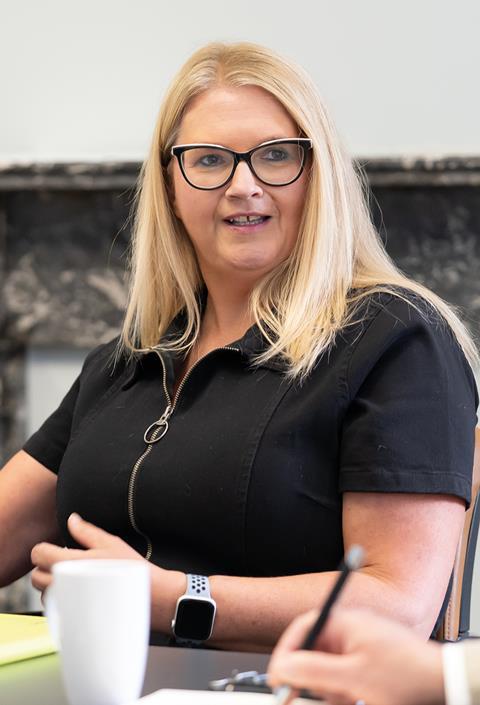
Another challenge was that some people adapted too well to working remotely. ‘A big issue for us is persuading everyone to come back – not full-time, but back to how things were before the pandemic,’ she added. ‘We’ve just moved offices, so we hope that this will be an incentive for people to return.’ Bolt Burdon Kemp has redesigned its workplace to encourage more mingling and incorporate social incentives, including a staff clubhouse ‘to make the transition easy and get people excited about coming back to the office’.
High street firms face a different situation. When high streets reopened, clients expected solicitors to be in the office, explained Emma Pearmaine, managing director of Yorkshire firm Ridley & Hall Solicitors. While some clients now communicate with the firm via apps and phone calls, elderly and vulnerable customers, and those with learning difficulties, still require in-person meetings, as do legal aid cases. ‘It is a requirement of a legal aid contract that your office is open… and when you don’t have huge staff numbers, it is quite difficult to make sure that there is always somebody in the office.’
Anchors away
At the other end of the spectrum, the pandemic forced some firms to make significant changes to their working practices. James Slater, chief technology officer at Plexus Law, had to give people laptops to take home. People are now expected to work three days a week in the office. ‘We are trialling the concept of an anchor day, where everyone has to be in the office so that people don’t go back to an empty workplace,’ he said. ‘But there is still flexibility based on people’s roles, responsibilities and meeting schedules.’ Challenges include performance and training: ‘Someone who is performing well is under less pressure to come into the office. Whereas someone not hitting their targets, for example, may need more supervision. The biggest challenge is trainees missing the ability to learn from the behaviour of partners and other lawyers.’
Remote management adds a new dimension to professional and career development. George Dunn, sales director at Cisco, sponsor of this roundtable, asked how managers dealt with having to suddenly learn how to get the best out of remote teams.
Plexus Law took specific measures. ‘At the start of the pandemic we set up support groups to make sure that everyone was OK and able to work from home,’ Slater said. ‘But we quickly realised that managers and team leaders also needed support, so we created a second group to coach and mentor them on how to manage a remote workforce. Some of our team managers are responsible for 40 people and managing them remotely was a different ballgame.’
The team of George Pantelides, chief administrative officer at international firm Dechert, is located in 22 of the firm’s offices. They found the shift from remote to hybrid working more challenging than the move from in-person to virtual working. ‘One thing about virtual working is that video gave everyone in a meeting an equal voice, with equal access to the microphone and camera,’ he said. ‘Hybrid has detached some of that equality because some people may have a less equal experience in person… so while we are encouraging people to come back in, we are also thinking about how to make hybrid work. We would love to strike a balance between the value of being together in person and the benefits of flexible working.’
'While more experienced people may question the need to work together, people earlier in their careers need supervision and guidance'
George Pantelides, Dechert
Having surveyed the firm and gathered local feedback, Dechert found people wanted flexibility, but they also wanted some certainty. The firm therefore introduced a foundational rule that people come into the office for at least half of the time. ‘There’s no base denominator, so it’s not per week or per month,’ explained Pantelides. ‘People make decisions based on what’s going on with their clients, their team, their office, but things are still evolving.’
Cripps is following a similar model. It offers flexibility depending on client, team, firm and individual needs, and within performance expectations. ‘But people are falling into routines, so they are coming in (to the office) on the same days each week,’ said Jo Owen, chief information officer and head of central services division. ‘Hybrid meetings are challenging but we are making them work.’
Owen acknowledged the need to accommodate younger, less experienced individuals. She said that while there is variation between different practice groups, it is important to ensure that apprentices and paralegals get the training they need. ‘We have to cater to both ends of the spectrum – some people want to come in a lot while others don’t want to come in at all.’
The generational mix is producing different responses to flexible and hybrid working. ‘While more experienced people may question the need to work together, people earlier in their careers need supervision and guidance,’ observed Pantelides. Dechert introduced team days to ensure ‘critical mass’ in the workplace, removing the possibility of people seeking guidance coming into an empty office.
Talking points
Paris Smith has adopted a hybrid policy, with people expected to work in the office five days a fortnight and departments managing their own staff rotas. Like others, Paris Smith added core hours to its hybrid working policy to avoid people coming back to an empty office.
Communication has been a key focus throughout the pandemic. ‘Our programme of mentoring, wellbeing sessions and mental health first-aiders was in place before the pandemic,’ said Sue Murphy, director of business development and digital marketing. ‘This gave people clarity around who to reach out to when they needed to talk. [Peter Taylor] our then managing partner, now senior partner, who was shielding during the pandemic, began sharing weekly video updates. He was quite open about how he was feeling and showing that vulnerability enabled others to do the same without worrying about how they might be seen.’
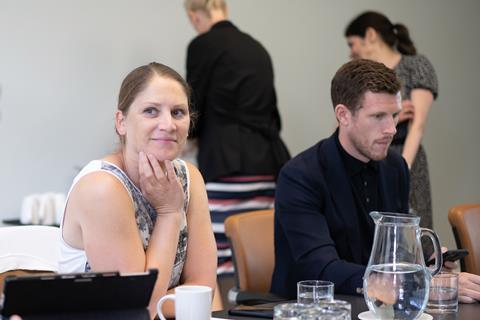
Online learning during the pandemic – the Paris Smith Academy provides soft skills training to everyone in the firm – received only tepid reviews. But people were more enthusiastic about in-person sessions. These showed that they were facing common challenges, for example about having difficult conversations with clients about billing.
Peter Haden, CEO at Fletchers Solicitors, found that the hybrid working introduced during the pandemic increased engagement and productivity. Furthermore, some difficult conversations became easier online than in person. ‘For example, if you’re shutting down a client case it is easier if you can have someone in the room who can hear what’s going on but isn’t intruding,’ he said.
Haden expressed doubts about ‘training by osmosis’: ‘It’s great if you happen to sit next to someone good, but if you don’t, you’re a bit at sea. We have to be more deliberate about how to manage supervision and apprenticeships.’
What do clients see as differentiators?
Client expectations of technology depend largely on their relationship with a law firm. ‘At Paris Smith we have lots of clients who have been with us for decades,’ explained Sue Murphy, director of business development and digital marketing. ‘They know our lawyers and the way we work. We have recently been through a massive catch-up, but technology still depends on client needs. Some would like client portals, but others would never use them.’
Cripps’ innovation programme ‘puts the client experience at the heart of everything, and we interview clients in particular workstreams’, said Jo Owen, CIO and head of central services division. ‘We found that most are asking for a particular experience, rather than what technology they want.’
Fletchers has invested in back-end technology facilitating decision-support and process flow, but less on client-facing technology, although the firm has a client app. ‘We review client feedback every Tuesday, and we have never had any comments relating to technology – they are all about people waiting for a call back, and there is a role for technology to remind our people to make those calls,’ acknowledged CEO Peter Haden.
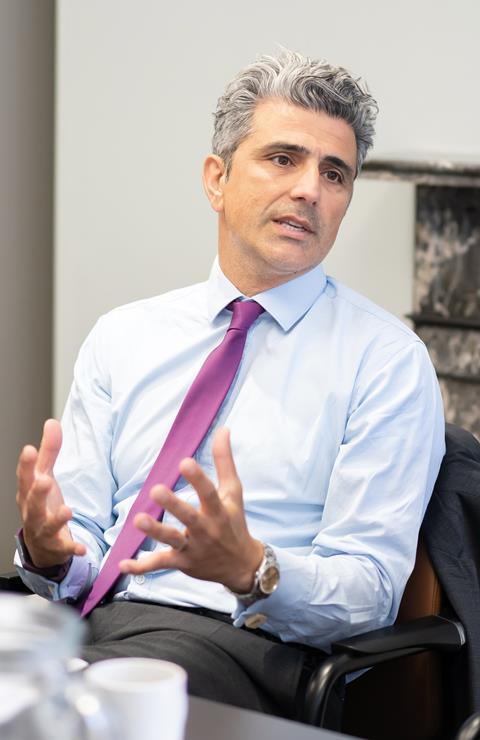
Amanda Garner, partner and compliance manager at Bolt Burdon Kemp, agreed: ‘Because we work in personal injury, we don’t want returning clients. Vulnerable people are not looking to embrace technology, and we don’t want to overwhelm them.’ The firm has invested in a system that makes possible calls via the internet. ‘The connection is better,’ she explained, ‘and we can monitor calls. Although we still give them the choice.’ The firm has also created soundproofed rooms in the office for such calls.
George Pantelides, chief administrative officer at international firm Dechert, has been impressed by people’s propensity to adopt new tools that previously would have required a rollout: ‘Adoption has been remarkable on the client side too. I had a client conference call where everyone dialled in, and we all made comments about how retro it felt. Dechert also has an innovation programme which is expanding – last year it had 40 people, and this year there are 80. The idea is to solve client problems and we have already implemented about two-thirds of last year’s ideas.’
Last year James Slater, chief technology officer at Plexus Law, interviewed key clients about what they wanted in terms of technology. ‘The common theme was that they face similar challenges to ours, particularly with regard to back-office efficiency. So we talked about how we could improve simple things – sending new instructions, raising invoices, doing billing – a lot of processes could be massively improved through introducing new technology and changing the way we work. That had a positive, resounding focus even though it wasn’t about delivering or improving legal services.’
Preserving culture in a hybrid world
How do firms preserve their identity and character in a hybrid world? Bolt Burdon Kemp’s culture is an important factor in recruitment and retention. ‘I believe that anyone in the firm would be able to tell you about its culture,’ said Garner. ‘Hybrid works brilliantly because people feel valued, that their lives matter. That goes a long way when it comes to retaining the right people. If you give them the right tools, and trust them to make the right decisions, they will do their best work. Our culture includes making things fun. Once a year the whole firm shuts down and we have a day out. In 2019 the whole firm went to Paris for the day.’
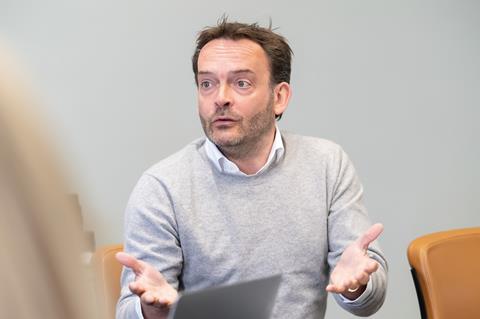
Dunn said: ‘The pandemic forced us all to go home. Now companies have to be more deliberate about how they go about their business. For example, there is a more deliberate focus on wellbeing and mental health.’
Culture is also about leadership. Murphy joined Paris Smith in 2020 between lockdowns. ‘When I first joined, the managing partner phoned at least twice a week and made sure I met everyone [virtually],’ she said. ‘I felt that I had the arms of the firm wrapped around me. Throughout the pandemic Peter [Taylor] was being asked to write and talk about how he managed to run a law firm of 260 people while shielding at home. The feedback he got on his weekly videos was phenomenal. He had a Paddington Bear toy in the background and it became incredibly well-known around the firm.’
Before the pandemic, Cripps conducted an exercise around defining their culture and positioning it as a differentiator. ‘We spent a lot of time interviewing all our people about what it meant to work at Cripps to find our characteristics,’ explained Owen. ‘They are care, imagine, achieve and enjoy. During the pandemic we had a new senior partner. We came to the end of our previous strategy so we started again from scratch by defining our purpose. When we went back out to our staff with the same questions as before, we found that those characteristics really stood the test of time… Everyone at the firm feels passionate about our purpose, which is around people, planet, clients and community, and they feed into our characteristics.’
'We are doing a deliberate refresh of our culture, in particular around values, behaviours and making a difference, especially to the planet'
James Slater, Plexus Law
Ridley & Hall Solicitors is engaging external consultants to identify what is important to colleagues and clients. ‘For the first time we have staff engagement in the business plan and the budget,’ Pearmaine observed. ‘When you’re a legal aid firm, you don’t have a lot of money for those things. So for that to be prioritised in the budget is a big thing.’
Slater explained Plexus Law’s cultural change initiative: ‘We are doing a deliberate refresh of our culture. Particularly around values, behaviours and making a difference, especially to the planet. Historically, there were bad behaviours around favouritism, people not being as open or inclusive as they should have been, and legal teams competing with support teams. The cultural refresh was aimed at fixing these things. Six-to-nine months in, we are seeing massive improvements across the business… To cement it further, we are integrating our values into performance development reviews.’
Community is a key element of Dechert’s culture. While Pantelides’ global team has always embraced virtual working, he believes that in-person meetings are the quickest way to build social capital. During the pandemic, Dechert tried to create social capital virtually, introducing a new mentoring scheme so that all associates, globally, had access to partners. Maintaining community also meant checking in on people, especially those struggling with the challenges of successive lockdowns who did not have a dedicated workspace at home, and helping those people return to the office.
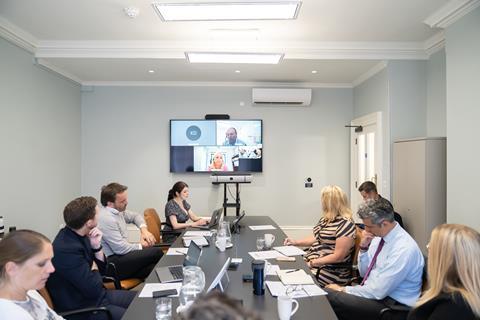
Value-added recruitment
Since Fletchers hired 120 people last year, Haden has focused on reflecting the values of his young team. This included undertaking an exercise with a group of junior employees to highlight values which were then reviewed by the leadership team. People can share their personal experiences and challenges on an online forum, which is supported by in-person events.
Pearmaine highlighted a positive outcome of pandemic-induced flexibility: ‘From an administrative perspective, [hybrid working] has supported retention because, historically, many of our lawyers would work from home, but our admin teams were expected to be in the office. Now that people can work around family and other circumstances, it is easier to retain them.’
Notwithstanding the jump in salary for newly qualified solicitors in commercial firms, compensation is not the main factor when it comes to recruiting top talent.
'We help people to upgrade their wifi so that they can work effectively from home. We would never have paid for things like that before the pandemic, but we do now'
Emma Pearmaine, Ridley & Hall
Fletchers’ recruitment proposition is based on career outcomes. ‘We are explicit about saying to interviewees, “If your objective is to earn the maximum amount of money, we are probably not going to be able to deliver for you. But if you’re interested in creating more value for yourself over the next five or 10 years… our development proposition – higher-quality work, more seniority or responsibility earlier in your career – will lead to a better outcome for you overall,”’ Haden explained.
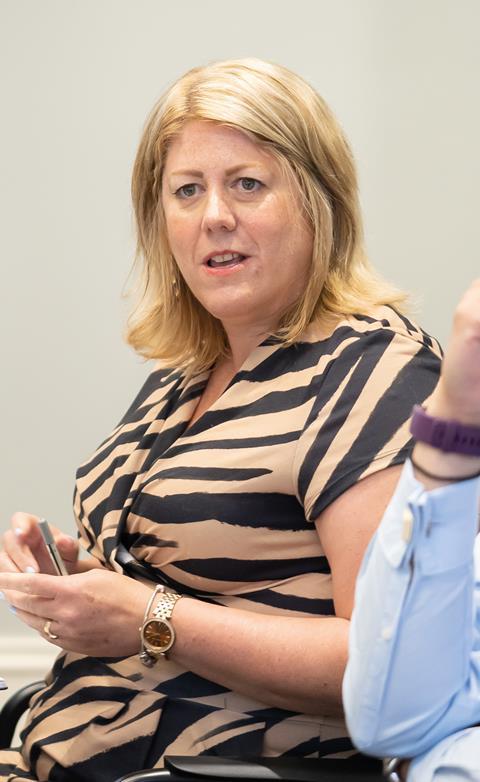
As Cripps’ CIO, Owen interviews technologists, but she is getting more questions about culture and environment. ‘I can’t recall an interview where someone didn’t ask me about our firm’s position on sustainability,’ she said.
Ridley & Hall Solicitors candidates are asked about their IT skills ‘because we rely on them to deliver’, explained Pearmaine – and the quality of their wifi. ‘We help people to upgrade their wifi so that they can work effectively from home. We would never have paid for things like that before the pandemic, but we do now.’
‘In the technology space, we are answering more questions than ever,’ observed Slater. ‘It’s not just the technology you have, the firm’s culture and what you’re doing to save the planet… It’s about doing all the right things to stop people moving on. You have to acknowledge that you’re not going to retain people forever, so it’s about making the proposition as attractive as possible for the short-term but being realistic enough to know that in two or three years people are likely to look elsewhere.’
Pantelides agreed: ‘You need to be able to articulate what the firm believes in, whether that’s due to people being “woke”, or because people think about purpose in a different way. People used to be attracted to a firm for different reasons. Now, maybe because firms are equalising [in terms of salaries], candidates are looking for a differentiator that might not be to do with compensation. It’s about values and culture, but also purpose. Purpose is a huge driver for retention as well as attraction.’
This roundtable was kindly sponsored by Cisco
Photographs by Victoria Middleton























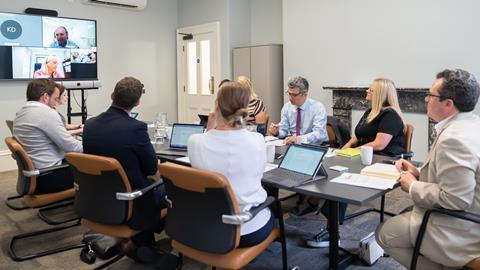








No comments yet